نحن لا نعالج فقط، بل نبقى معك…
عزز جمالك الطبيعي مع علاجاتنا الطبية التجميلية المتخصصة. نجمع بين التكنولوجيا المتقدمة والرعاية الشخصية لمساعدتك في تحقيق أهدافك الجمالية بأمان وفعالية. اكتشف الأفضل في طب التجميل في تركيا.
عزز جمالك الطبيعي مع علاجاتنا الطبية التجميلية المتخصصة. نجمع بين التكنولوجيا المتقدمة والرعاية الشخصية لمساعدتك في تحقيق أهدافك الجمالية بأمان وفعالية. اكتشف الأفضل في طب التجميل في تركيا.
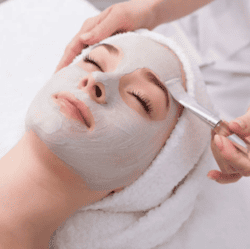
Effective skin care relies on two essential factors: the method of application and the quality of the products used. Whatever touches the skin — be it a cream, lotion, serum, or oil — should be carefully selected from high-quality, dermatologically tested options. Trusted brands formulate their products to ensure safe absorption and visible results while minimizing adverse reactions.
Equally important is how these products are applied. Factors such as absorption time, targeted application areas, and frequency of use all affect the outcome. Proper technique helps maximize the benefits of each product and supports the skin’s natural renewal process.
Maintaining good skin requires a combination of lifestyle habits and mindful product choices. Personal hygiene is fundamental — clean, breathable skin with unclogged pores is more receptive to active ingredients and maintains a fresh appearance.
Staying away from harsh chemicals and low-quality cosmetics is crucial. Natural or organic skincare alternatives, free from irritants and artificial additives, are often better suited for long-term skin health.
Alongside topical treatments, a balanced diet, physical activity, and mental well-being play vital roles. Eating fresh, vitamin- and mineral-rich foods supports collagen production and helps the skin regenerate from within.
Everyone desires to look their best — not out of vanity, but because a healthy, vibrant appearance reflects overall well-being. A smooth, glowing, and youthful complexion contributes to self-confidence and leaves a positive impression.
True skin care is not just about external treatments; it’s about embracing a lifestyle that nurtures the body and soul. This includes managing stress, staying hydrated, and protecting the skin from environmental damage.
Fresh air and regular physical activity are often overlooked but incredibly beneficial for skin health. Exercise increases blood circulation, boosts oxygen flow, and supports the body’s natural detox processes through sweating. As a result, skin appears more radiant, firm, and energized.
To truly support your skin, combine external care with internal nourishment. Prioritize whole foods, minimize sugar and processed ingredients, and consider antioxidant supplements if necessary. In doing so, you’re not just caring for your skin — you’re enhancing your overall vitality.
Filling applications are among the most widely preferred procedures in modern medical aesthetics, with hyaluronic acid being the most commonly used substance. As the skin ages, levels of collagen, elastin, and hyaluronic acid naturally decline, leading to loss of volume, elasticity, and hydration.
During filling procedures, hyaluronic acid — a gel-like substance — is injected beneath the skin using fine needles. This material increases the skin’s ability to retain moisture, adding density and volume to the targeted area. Its water-binding properties help the skin appear plumper, smoother, and more youthful.
Filling treatments can serve multiple purposes. They are frequently used to soften deep or fine wrinkles on the face, enhance the volume and definition of the lips, contour the cheeks, chin, and under-eye area, and minimize the appearance of deep acne scars or other types of skin indentations.
Hyaluronic acid provides a number of benefits. It helps the skin maintain smoothness and flexibility, supports the repair of acne-related damage, and contributes to a fuller, more hydrated appearance of the lips. It also plays a vital role in the production and maintenance of collagen fibers, which are essential for skin elasticity. Additionally, it aids in reducing inflammation and irritation. As the body ages, the rate of cell regeneration slows down. Hyaluronic acid helps counteract this by supporting the skin’s natural renewal processes.
A newer approach within this field is called light filling. This technique blends principles from mesotherapy and traditional fillers, aiming to enhance the skin’s ability to reflect light, giving it a radiant and refreshed appearance. Typically performed in three sessions spaced 3 to 4 weeks apart, noticeable results are often visible after the first application, with improvements continuing over subsequent sessions.
Filling treatments are commonly applied between the eyebrows, around the nasolabial folds, and along the fine horizontal lines above the lips. Additionally, low molecular-weight fillers can be used to rejuvenate the neck and the backs of the hands. In certain cases, fillers are also used to correct minor imperfections in the shape of the nose, offering non-surgical alternatives to nasal reshaping.
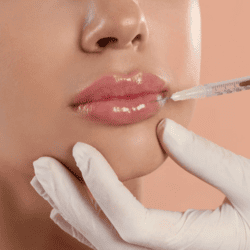
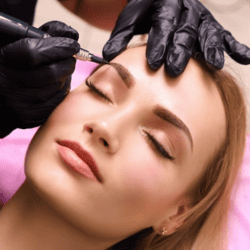
Permanent makeup is the art of applying safe, personalized pigments into the skin using micro-needles through a process called micropigmentation. This technique enhances natural features and offers long-lasting cosmetic results.
Micropigmentation can be applied in various areas:
• Eyebrows using hair stroke or shading (tozz) techniques
• Scalp pigmentation for hair loss
• Permanent eyeliner and dip-liner
• Permanent blusher
• 3D lip coloring
• Areola correction after surgery
• Camouflaging scars from surgery or skin conditions like alopecia and post-cancer nipple reconstruction
Before undergoing a permanent makeup procedure, pay attention to the following:
• Which brand and quality of pigments are used?
• Do you have any allergies to the ingredients?
• Is the procedure carried out in a hygienic environment?
• Is the practitioner licensed and experienced?
Proper care is crucial for healing and long-lasting results:
• Minor swelling or bruising may occur—apply cold compresses gently
• Avoid touching the area unnecessarily
• Stay away from sun exposure and tanning beds
• Use sun protection and apply herpes cream if advised
• Avoid salty foods after lip procedures
• Do not apply makeup or cosmetic products on the treated area
• Never pick or scratch the scabs; let them fall off naturally
• Apply chilled chamomile tea compresses with a clean gauze for soothing effect
Permanent makeup is not recommended for the following individuals:
• Anyone under the age of 18
• Pregnant or breastfeeding women
• People with diabetes or undergoing chemotherapy
• Those using Roaccutane
• Individuals with eye infections, eczema, fungus, or verruca
• People with schizophrenia or pigment allergies
• Those with broken capillaries or moles on the treatment area
Laser hair removal is a cosmetic procedure designed to eliminate unwanted body hair permanently. It works by targeting and damaging the hair follicles with concentrated laser light, preventing future hair growth. This method can be safely used by anyone who has completed puberty.
Unlike shaving, waxing, tweezing, or chemical depilation—none of which offer lasting results—laser hair removal offers a more permanent and efficient solution for both men and women.
During the procedure, laser beams are directed at the hair follicles beneath the skin. The pigment (melanin) in the hair absorbs the light, which converts into heat and damages the follicle to inhibit or delay regrowth.
There are different types of laser technologies, but the two most effective and widely used systems are:
Alexandrite Laser
Ideal for lighter skin tones with dark hair, this laser targets the hair follicles just below the surface of the skin, offering fast and effective results.
Diode Laser
Diode lasers have a longer wavelength, making them suitable for darker skin tones. While the mechanism is similar to Alexandrite, Diode lasers penetrate deeper, providing safe and efficient treatment across a wider range of skin types.
Laser hair removal is typically performed in 4 to 9 sessions, depending on hair type, skin tone, and the area being treated. Completing the full treatment plan is essential to achieve long-term results.
Laser hair removal is a medical-grade procedure that requires trained professionals and high-quality equipment. The success and safety of the treatment greatly depend on the clinic’s technology and the expertise of its staff. It’s also important to investigate the root cause of excessive hair growth—especially if hormonal imbalances are suspected—before starting treatment.
Laser hair removal is suitable for almost all body areas, including:
• Underarms
• Bikini and genital area
• Legs
• Arms
• Face (upper lip, chin, cheeks, sideburns)
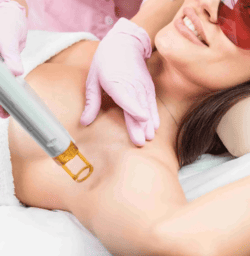
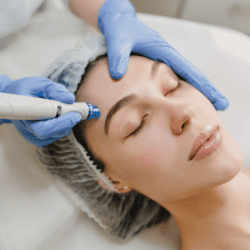
Mesotherapy is a cosmetic medical technique first developed by Dr. Michel Pistor in 1952. It involves the injection of homeopathic agents, pharmaceutical substances, vitamins, and herbal extracts into the skin and subdermal layers to promote various therapeutic and aesthetic benefits.
Some bruising or mild swelling may occur at the injection sites. Since the injected substances act locally and do not enter the general bloodstream, these side effects are usually temporary and resolve quickly.
Cellulite Treatment:
Cellulite, characterized by dimpled or uneven skin, affects both men and women and is often linked to hormonal imbalances and lymphatic circulation problems. Mesotherapy can provide visible improvement after 4 to 10 weekly sessions. Maintaining the results with a healthy diet can help make the effects permanent. The injections work by improving blood and lymph flow, breaking down fat deposits, and softening hardened connective tissue.
Localized Fat Reduction (Local Lipoidosis):
Mesotherapy serves as a non-surgical alternative to liposuction for reducing localized fat deposits on areas such as the abdomen, waist, arms, and legs. It helps burn fat cells in the targeted zones.
Scar Treatment:
Scars form as part of the natural healing process after skin injuries but can sometimes be thick or irregular. Mesotherapy is used to improve scar appearance by stimulating tissue regeneration. Typically, 5 to 6 sessions spaced three weeks apart are recommended.
Skin Rejuvenation (Mesolift):
Sun damage and aging cause collagen loss and skin dullness. Mesotherapy infuses vitamins, antioxidants, and connective tissue stimulants into the dermis to restore a youthful, firm, and glowing complexion. This anti-aging treatment usually involves 2 to 4 weekly sessions and promotes collagen synthesis for tightening and revitalizing the skin.
Other Conditions Treated With Mesotherapy
• Hair loss
• Skin problems related to puberty and pregnancy
• Scar revision and tissue healing
Mesotherapy is not recommended for:
• Pregnant women
• Stroke survivors
• Individuals with diabetes mellitus
• Cancer patients
• Those with blood clotting disorders
• Patients with complex heart conditions requiring multiple medications